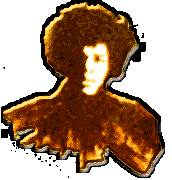The Grandfather of Rap and Jimi Hendrix: part 2
 But Jimi was rockin' it with a whole new old-roll/role, and he was like a new blues all by himself. So I was pleasantly surprised when I found out that he had become an instant fan, and yet at the same time, considering the economy of the Last Poet's music at the onset of our first album, I didn't think our music was turning him on, so I figured it must be the message.
But Jimi was rockin' it with a whole new old-roll/role, and he was like a new blues all by himself. So I was pleasantly surprised when I found out that he had become an instant fan, and yet at the same time, considering the economy of the Last Poet's music at the onset of our first album, I didn't think our music was turning him on, so I figured it must be the message.
Although I wasn't a fan of his music then, I knew that when I got a minute I'd have to check him out, and see what all the fuss was about, because I was a fan of his rebelious image at that time, that he was projecting, in breaking the then conventional modes of artistic expression, and he confirmed that he was a fan of my message, and dug the way I rapped. At that time, Jimi's music was more popular with the white youth, than the black youth in America as well as England, and Jimi wanted to expand his fan base within the black community.
A lot of this was due to the type of music he played, which struck me as rock based in the blues. But to the black community at that time, rock was associated with famous white rock groups, who had separated rock from roll, such as The Grateful Dead, Black Sabbath, Jim Morrison "The Doors, The Byrds, The Mamas and Papas, Frank Zappa, The Beach Boys and other artists of that genre.
The black community for their part, were into James Brown, The Jackson Five, The Funkadelics, The Spinners, Harold Melvin and The Bluenotes, The Vibrations, Marvin Gaye and Stevie Wonder and Sly "The Family Stone, Dick Gregory & Richard Pryor, The Temptations, The Four Tops, Aretha Franklin, and many, many more dynamic black artist of the day, including The Last Poets.
Plus heavy metal was becoming known as the hardness within the rock, like bebop became the hardness within jazz.
So Jimi was considered a black artist playing rock music, the way that rock musicians wished they could play. But the black community had witnessed rhythm and blues, give birth to rock n' roll, only to see rock jettison roll, and become just rock, which was played primarily by white musicians, and they weren't sure if Jimi was playing white music in a black way, or black music in a white way, or both, and at that time at the end of the sixties, and the beginning of the seventies, they weren't sure about his music.
Thus they were happy for his success, but ambivalent about his art at the time, and attributed his success to his popularity amongst the white youth, in particular the hippie generation of that era, who brought most of his albums.
I wondered if Jimi wanted me to help bridge that gap with my rap, so that the black community could dig the roots of his music. I knew that he was a revolutionary artist, who had revolutionized the way the electric guitar was played, and how, and would influence generations to come, long after he was gone.
But outside of his art and reputation, I had no idea where Jimi was coming from until I met him in person. At that time, the black revolution in America was in progress, and the black community in general, wanted to know where Jimi stood on the issue of the revolution.
But Jimi felt misunderstood, or not understood at all, and focused his attention on making his position known, in regards to the Vietnam war, which was raging at the time, and he did it primarily through his music, rather than his lyrics.
Since both black and white youths were against the war, it was a central theme, that everybody could identify with.
